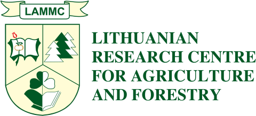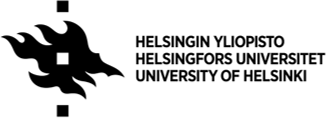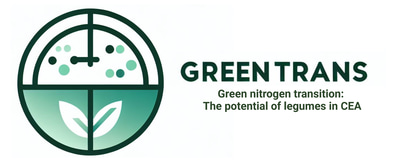Leader:
Dr. Aušra Brazaitytė
Team:
Dr. Giedrė Samuolienė
Dr. Akvilė Viršilė
Dr. Audrius Pukalskas
Dr. Rūta Sutuleinė
The Lithuania Research Centre for Agriculture and Forestry (LAMMC)
is the key R&D competence centre in the region, having close relations with farms and industries. LAMMC mission is to generate, garner and disseminate new scientific know-how for sustainable land, forest and environment resources, their competitive development and use, elaboration of innovative technologies and products to meet the needs of industry and society. Agriculture, forestry and fishery industry generates about 3,5% of national GDP, therefore innovations and qualification in these fields can have a direct influence on the economy and competitiveness of the country. LAMMC has sufficient human resources and a scientific base to carry out the project. 2021 LAMMC conducted six long-term research programs. There were implemented 32 various international projects, including Horizon2020, INTERREG and etc., and 77 national research projects, funded by the Research Council of Lithuania, Ministry of Education and Science, Ministry of Agriculture, Ministry of Environment, and every year undertook over 150 outsourcing work projects for national and foreign economic entities till 2023. A total of 140 varieties of agricultural plants bred at LAMMC are currently included in the Lithuanian National List of Plant Varieties and the EU Common Catalogue of Varieties of Agricultural Plant Species. In addition, during the last five years, about 130 high-ranking publications have been published every year in CA WoS DB, and 80- 90% of them are in Q1-Q2. LAMMC Institute of Horticulture (LAMMC IH) has five laboratories and departments that are fully equipped with various equipment for laboratory and field experiments. Besides, Open access centre four agrobiologically research laboratories are located in LAMMC IH: Cryobiology, Plant photophysiology, and Plant metabolites and Molecular markers. As well as the Nacional food cluster, which supports small companies’ development providing knowledge-based solutions for the creation of specific recipes, technologies, and production of experimental fruit and berry higher-value production.
In the LAMMC IH Laboratory of Plant Physiology, the experiments are carried out in a phytotron complex with a controlled environment walk-in growth chambers, and a greenhouse. The experimental complex includes a lighting system consisting of programmable light-emitting diodes (LEDs) lamps: HORTILED flexible LED-based plant devices, Heliospectra RX30 LED light lamps, custom-made LED lighting equipment and conventional HPS lamps. Chambers are equipped with hydroponic systems for plants cultivation such as Ebb and deep float. Thai main R&D areas related to his project are: Physiological research focuses on biology, plant photophysiology (the manipulation of metabolism, the creation of plant irradiation and biofortification techniques), ecophysiology (modulation of differential and complex impact of changing climate and anthropogenic factors on plant growth and development) and plant productivity (optimization of crop physiological parameters by technological means, the formation of biopotential and realization in ontogenesis). The competent specialists perform the analyses of various biochemical analyses using a chromatographic (Shimadzu UHPLC) system with different detectors (ELSD, DAD, MS, RF) (bioactive compounds), SPECTROstar Nano UV-Vis spectrophotometer (crude proteins, antioxidant enzymes, radical scavenging ability, etc.), Spectro Genesis ICP-OES spectrometer, and Anton Paar mineral digestion system (elemental composition). A leaf area meter, drying oven for measuring dry weight, and non-destructive equipment (the meter for chlorophylls and flavonols Dualex®4, the portable system for photosynthesis measurements LI-COR) allow us to evaluate the photosynthesis process in plants and to determine their productivity.
University of Helsinki (UH)
The Department of Agricultural Sciences is an internationally leading research and teaching unit that conducts cutting-edge research and provides higher education based on the latest knowledge and modern university pedagogy on animal production, plant production, environmental soil science and agrotechnology and yields societal impact through research. The Department is responsible for BSc and MSc Programmes in Agricultural Sciences. The Department is the only university-level research and teaching unit in the agricultural sciences in Finland. Its multidisciplinary research and education strive to strengthen both basic and applied agricultural expertise and are strongly system- and problem-based. The quality and breadth of the research are strengthened further through intensive networking and stakeholder contacts both nationally and internationally. External funding for research amounts to 43% of the total budget and the number of PhD students is about 30 per year. The existing modern and partly unique infrastructure offers good support to the Department’s multidisciplinary research and teaching, from field studies to laboratory analyses. The Department of Food and Nutrition carries out research that is of high quality and internationally acknowledged within its field. The department provides research-based education at a higher level in Finland and is responsible for BSc and MSc Programmes in Food Sciences and MSc Programme in Human Nutrition and Food-Related Behaviour. External funding for research amounts to 40% of the total budget and the number of PhD students is ca. 30. Up-to-date laboratory equipment and facilities including processing plants are available for research. The department values its good connections to the food industry. One of the key areas in research is food systems and production chains, where the focus is on food processing, especially in the management of the processing chain of domestic food raw materials including packaging technology. By-products (circular economy) and microbial resources are widely utilized in the research. Another key area is food quality and healthy nutrition focusing on the impact of food constituents and their properties on the healthiness and sensory quality of food. The aim is to enhance the chemical and microbial safety of food and to take part in risk assessment and management. Also, factors associated with the choice of food and the impact of diet on sustaining health are important. University of Helsinki has fully controlled greenhouse, growth room and growth chamber facilities with integrated automated plant phenotyping platform (NaPPI, https://www.helsinki.fi/en/infrastructures/national-plant-phenotyping/national-plant-phenotyping-infrastructure-nappi). Experiments will be conducted in these facilities in which both NFT and ebb and flow systems. The basic equipment to monitor the plant growth and morpho-physiological traits at the growth facilities include e.g. LI-6800 Portable photosynthesis system, FluorPen FP110 Chlorophyll fluorescence meter, LI-190R Quantum sensor, MPM-100 Multipigment meter, MC-100 Chlorophyll concentration meter, SC-1 Leaf porometer, LI- 3000 Leaf area meter, Horiba LAQUAtwin nitrate meter, Infrared thermometers, EC-meters. The infrastructure in Viikki campus includes equipment such as UHPLC and HPAEC-PAD for metabolite analysis, ICP-OES for mineral analysis, DA for nitrate and ammonium analysis, and Leco for total N analysis.
IVL Swedish Environmental Research Institute
is an independent, non-profit research organisation owned by a foundation established by the Swedish government and industry. IVL was established in 1966 and has since then been involved in the development of solutions to environmental problems at national and international level. The institute comprises Sweden's largest group of environmental experts and employs around 400 individuals, which makes IVL a leading institute for applied environmental research and consultancy services. The division of Life Cycle Management, within the Sustainable Society department, currently hosts the Sustainable Urban Food lab, which carries out research on sustainable food production in urban environments. Within this lab, a large number of projects are associated with sustainable techniques for vertical and urban farming systems. Researchers included in this study collaborate extensively with commercial actors in the vertical farming field, having research labs in commercial environments at Grönska Stadsodling, Nära Sverige, and Farmy (all employing hydroponic ebb-flow systems). These include specific areas in the commercial farms to experiment, and additionally IVL researchers currently own and operate cabinet farming facility, employing the GrowOff module unit from Grönska, with several further experimental facilities being purchased for testing of nutrient solutions, growing media, and mushroom farming. IVL also hosts a laboratory which can tests for contaminants in soils and plants, in addition to collaboration with KTH Royal Institute of Technology for analyses of metabolites and other quality parameters for vertically farmed products.
Leader:
Dr. Pirjo Mäkelä
Team:
Dr. Hirofumi Ishihara
Dr. Minnamari Edelmann
Dr. Asko Simojoki
Leader:
Dr. Michael Martin
Team:
Elisabet Henriksson, PhD candidate





